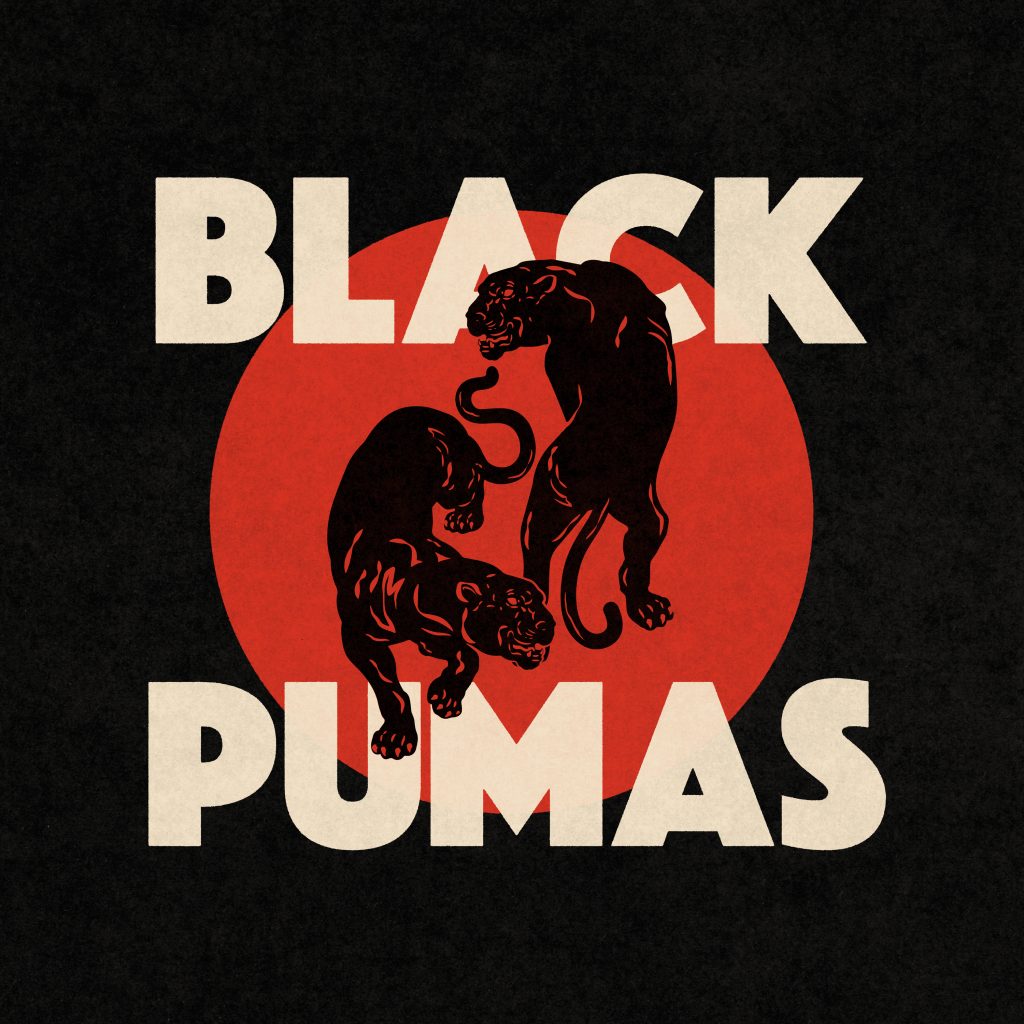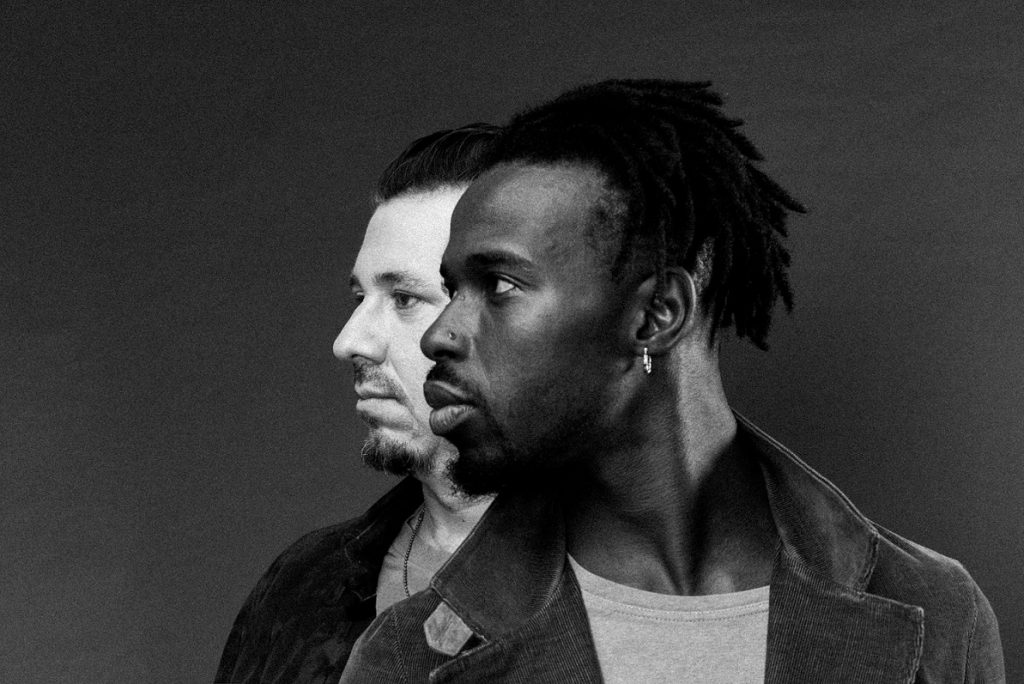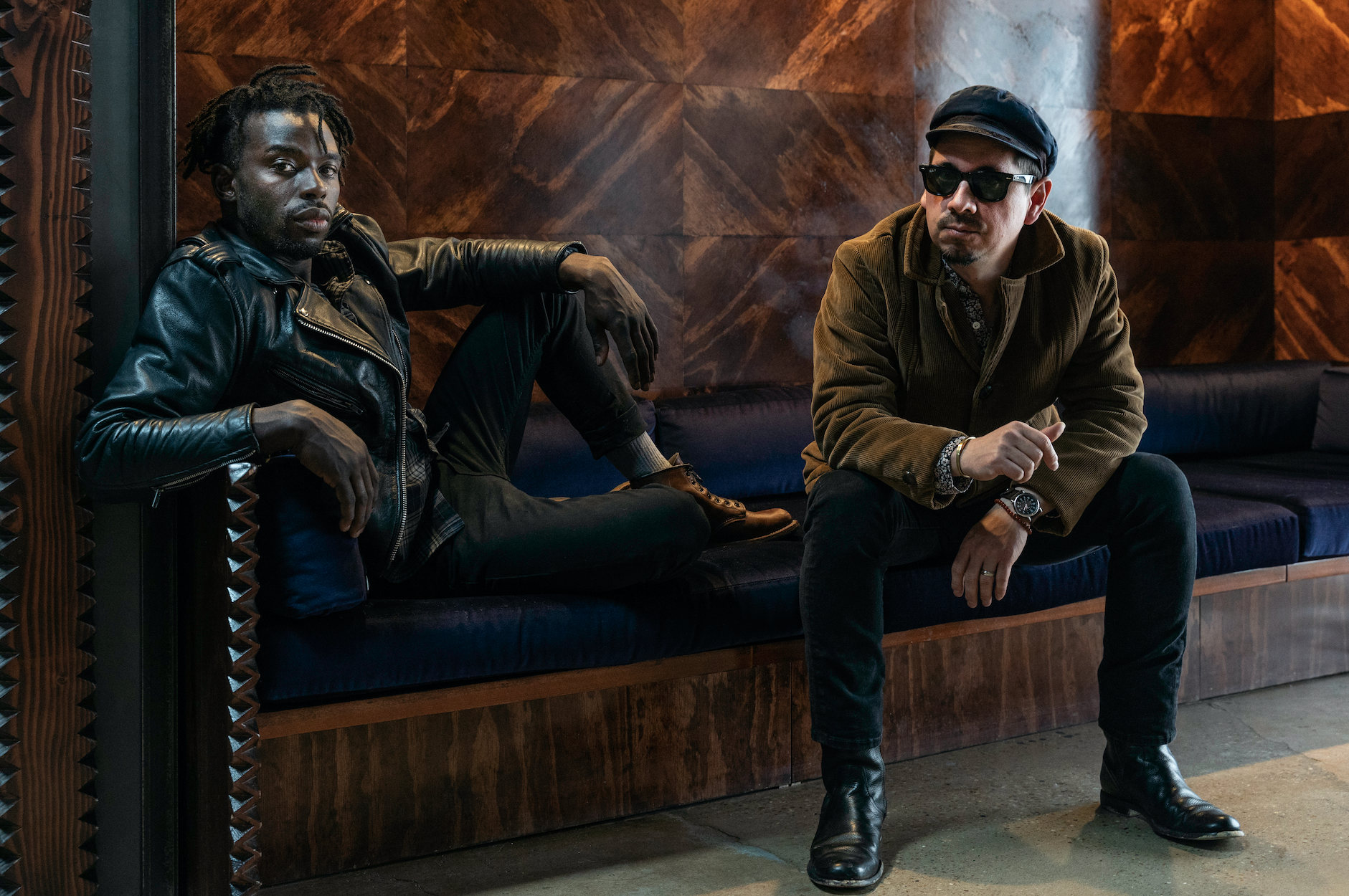Foto-© Merrick Ales
Adrian Quesada kennt in der Gegend von Austin, Texas jede/r. Der Produzent und Gitarrist inkludiert schon länger mexikanisch-lateinamerikanische und US-amerikanische Einflüsse in Bands, die Grupo Fantasma, Brownout oder The Echocentrics heißen. Mit dem neuen Bekannten Eric Burton, der als Straßenmusiker begann, wendet er sich einem anderen Feld zu. Beats aus dem Hip-Hop der Prä-Laptop-Ära kommen vor und in Burtons Stimme entdeckt man Spuren aus dem Soul vergangener Jahrzehnte. Auf dieser Grundlage ist dem Duo ein Debüt gelungen, vor dem man sich ehrfürchtig verneigen darf. In Black Moon Rising kommt ein Schlagzeuglauf vor, der RZA vom Wu-Tang Clan gefallen könnte. Zeitgleich erkundet Burton mit Gedanken an Marvin Gaye und Bobby Womack im Kopf lunare Sphären. Colors ist ein Appell an die Zusammengehörigkeit, Gospel-Andeutungen unterstützen das.
Normalerweise muss man bei Pumas vorsichtig sein. Diese beiden Exemplare hier möchte man dagegen gerne als Haustier haben. Wir haben in Berlin ein bisschen mit ihnen gekuschelt.

You‘ve supported the British group The Heavy in Berlin last weekend. How would you sum up the time spent here?
Eric: It‘s been quite lovely. Even the weather in its gloominess still feels really good. I‘ve been to beautiful parks to see the sunshine trickle through the leaves and I enjoyed the water greenery and happy smiles on people‘s faces, To me it was a very cinematic experience. The people listening to our music recognize a similar cinematic quailty in our songs and I can now see a connection between the feeling of life in Europe and the music that we are making.
Adrian, you don‘t often have enough time to relax. You tend to be pretty busy judging by the number of projects you‘re involved in. How on earth did you find the time to start yet another thing?
Adrian (lacht): I‘ve streamlined my work and this is my main focus for now. In 2017, right before we met, he was doing his own thing as a songwriter and I had started writing some songs independently. Funnily enough I had a little bit of down time. For two months I had nobody booked into my studio, I just sat there on my own and wrote wrote wrote. Then I met Eric, we sporadically worked on some music together and then we played our first show in February last year. After that we started getting serious about this realizing how fun and inspiring the band was. I started to focus on this and said to myself: This is what I want to do. Sure I don‘t want to spread myself too thin here.
I read that Eric had to audition before you made a decision and chose him. Is that true at all?
Adrian: No, it isn‘t. I knew it was going to be him but I couldn‘t let him on that easy. I had to act like I had a lot of options. I had asked a bunch of people all over the world and looked these people up on youtube but I always said no, I‘m not inspired. Then finally a mutual friend said there‘s this guy Eric who might be a perfect fit. I saw he‘s playing a lot of gigs where he‘s just playing solo on a guitar which was immediately intriguing to me because it seemed so sincere. It was less like somebody fronting a throwback retro soul band. It just sounded like him, with references to the past but equally inspired by Neil Young or Bob Dylan as by Al Green or Marvin Gaye.

When you heard Adrian‘s sound, how did you respond to it?
Eric: Initially I was an acoustic guitar player and singer songwriter who looked up to folk heroes. First I didn‘t how to add something valuable to what Adrian had presented to me. I was clueless. Then I played his music to the roommates I had at the time. In Austin people have a predilection for some of the older black music and my friends had great references hinting at Otis Redding, Aretha Franklin or Al Green. They advised me to go back and study the diction and flexion of these old soul heroes. That‘s what I did. I desperately dived into the archives to get some of the tricks they were using to make their music. While I was studying the sound I tried to write something lyrically that works within that, as poetically as I could but in a simple way as well. It was a lot of pressure, to be honest, I did more research than I did writing. The songs Black Moon Rising and Fire were only half finished the night before I went to the studio for the first time. Being under pressure and under fire pushed me to finish it. I used all the information I‘ve absorbed over time so that I‘m able to give an honest reciprocation of my culture.
The title Black Moon Rising indicates a willingness to show the strength of black culture. Do you want to give the listener the feeling how important it can be? The next song on the album is called Colors. It‘s not about blackness, it‘s about all people living on this planet. How do you explain the juxtaposition of these two aspects?
Eric: To me the most beautiful thing about the way we present ourselves as a band is that we‘re not trying to make people look at something specific in politics or wave a black flag around. In the beginnings of the group we had conversations with each other pointing to the fact that we don‘t want to be mistaken as a voice of just one group of people. It‘s about inclusion, not excluding anybody. The blackness in the song, it comes from a sense of wanting to connect with an edgy dark side. Soul music is very light and very airy and it can be very happy. I wanted to have the antithesis of it to converge in this yin and yang kind of way in order to provide a balanced portrait of our experiences in the moment. I‘d be lying if I said politically I‘m not affected by certain people or groups that think a certain way about black people and black culture or Latin people and their culture. I think there are undertones of us touching on those things to a small degree unconsciously. For the most part we don‘t think about that at all.
Adrian: The original idea for the instrumental to Black Moon Rising came to me on the first day of the solar eclipse in 2017. The imagery that was conjured with the idea of the black moon during the solar eclipse had a huge impact on me at the time. It didn‘t include any kind of political or cultural slant for me.
Adrian, you‘re not working with music influences from Latin America or Africa in Black Pumas. This time it‘s more based on hip hop. Why is now the right time to show this particular leaning?
Adrian: Originally my entry way into discovering soul, funk, jazz and other kinds of music was through hip hop. On the radio I could hear either American Top 40 stuff or Mexican music from across the border. As a typical teenager I was against that. I didn‘t want to hear my grandparents music, I didn‘t want to hear mariachi music, I wanted to hear the Beastie Boys and Public Enemy and rock‘n‘roll artists like most 13-year-olds. Hip hop was the first music I was really obsessed with. When I was 18 and about to go off to college, it was the golden era of sampling in hip hop. People started to discover the samples behind the songs, whether it was by James Brown or Kool & The Gang or jazz artists. At that age I developed a more discerning ear. I wanted to learn about jazz after Pete Rock sampled a jazz song. This my entry way into music, I can never forget that. It‘s my base.
A number of people call the Black Pumas a psychedelic soul band. It‘s your own description as well on your Facebook page. Why is it a fitting term for the music you‘re making?
Eric: When I think about the music of the Black Pumas it‘s not just about psychedelic soul for me. This is just the infancy of this project and we look forward to adapting all walks of life and all genres that are possible. At the end of the day it‘s just a bunch of colours. We‘re in a room with a huge colour palette in front of us we can use.
Adrian: I‘m okay with the term psychedelic soul because it alludes to the atmospheric and cinematic quality that you can find in our music. But I wouldn‘t call ourselves retro soul. I do listen to artists from that genre but if I take Leon Bridges as an example, I prefer his more adventurous second album to his traditional first one. There are a lot of bands who make it seem like a concept from the 1960s and that was never our idea. It‘s 2019 now. I like the idea that a listener thinks we‘re from the 60s or 70s and another one thinks we‘re a 2019 band. We‘re not running away from the present time.
We‘ve talked about the beginning of the album, let‘s embrace the end too. Why is the song Sweet Conversation the perfect final moment for you?
Adrian: I‘m enjoying moments of vulnerability on a record. On a Beatles album you can have a little break all of a sudden and you hear something different to the previous song. We wanted to give people a break from this dense sound. Originally we had no last song for the album. I texted Eric asking him whether he‘s got any new ideas. He sent me a bit with him playing guitar and I knew on the spot that this is exactly what I wanted. We recorded it pretty much live and added a few things on top and found a great last moment. I like that winding down feeling at the end of the night, like taking off your shoes, looking at the stars and having some quiet time full of peace and reflection.









